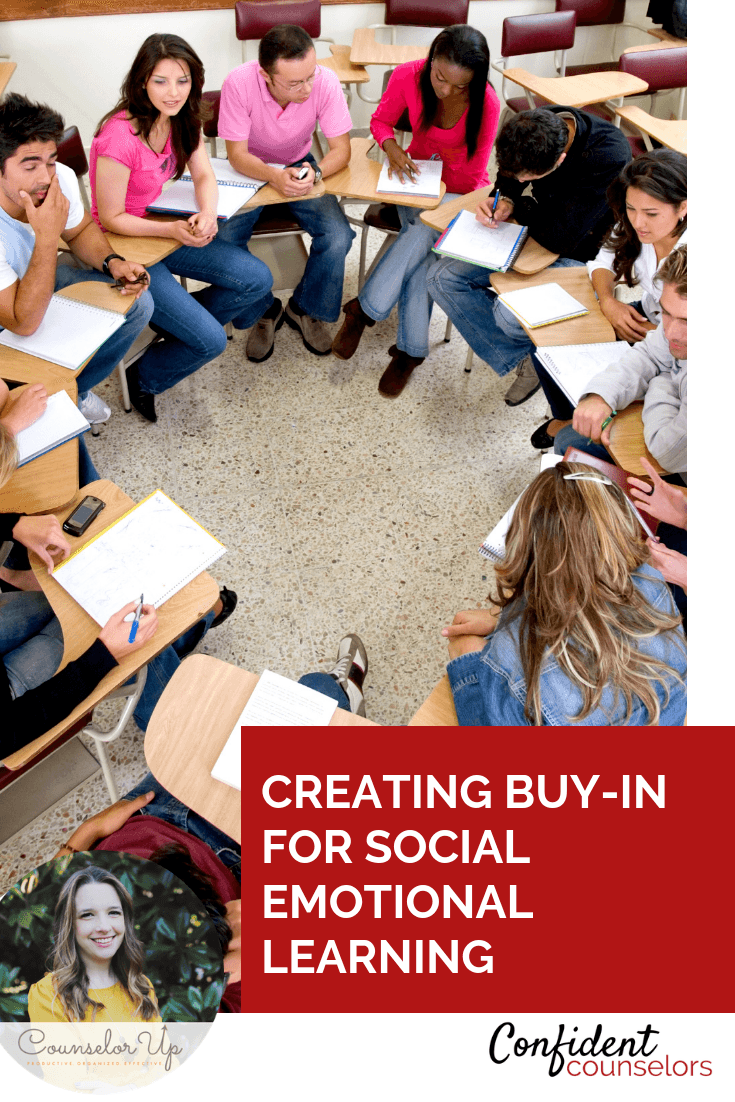Are you working on creating buy-in for social-emotional learning at your school? This post is for you to share with other educators in your building to spread the word about why Social Emotional Learning is important.
Think about the best job you’ve ever had. It could be in your education career, it could be at an ice cream shop in high school. What did you love about it? I bet you liked your boss. They cared about you. They wanted you to be successful and they were going to walk alongside you to make sure that happened.
Now imagine a time when you’ve learned something new. Something hard. Something you didn’t master right away. What did you feel? Probably frustration, probably times when you were ready to give up. How did you want to be treated while this was happening? You probably wanted some guidance but mostly to be able to figure it out.
When we combine these two experiences, we create a classroom. The teacher is the boss and students are all trying to learn something new. Learning happens best when we are in a supportive environment where we feel socially and emotionally safe. Social emotional safety is a bit different from social emotional learning.
Social Emotional Learning (SEL) requires skill acquisition by the learner. The National Center on Safe Supportive Learning Environments defines Emotional Safety as “An experience in which one feels safe to express emotions, security, and confidence to take risks and feel challenged and excited to try something new.”
They describe three basic tenets of emotional safety:
Emotions are important in the classroom.
SEL is fundamental to learning and includes 5 core SEL skills.
Effective instructional methods for teaching SEL skills are active, participatory, and engaging.
Emotions in the Classroom
Emotions are important in the classroom for two reasons. One is that emotions have an impact on learning. Students who feel safe and aren’t afraid to make mistakes are more likely to take risks and learn new materials. Secondly, managing emotions is a skill that students must develop to be college and career ready.
When working with your classroom teachers, help them explore how students express emotion in their classroom and the response of the class to that expression. If students aren’t able to express emotion without being reprimanded, consider exploring trauma-informed schools strategies to help your teachers to understand how trauma and other outside-school factors, can effects students ability to regulate their emotions to learn. If students can express their emotions but often choose inappropriate or disruptive expressions, direct social emotional instruction in managing emotions and calming down might be appropriate.
SEL is Active, Participatory, and Engaging
Classroom lessons with explicit instruction in Social Emotional skills have an important place in SEL. However, the best learning takes place in the moment of need. When a student is resolving a conflict with a peer, teachers and counselors have an opportunity to practice the skill that may have previously been taught in a conflict resolution lesson. Don’t let these moments pass you by!
Consider how the class can incorporate these moments into all instruction to increase academic and social emotional skills. For example, if two classmates are debating the main idea in an argumentative text, teach them about verbal and nonverbal communication so that they can practice this new skill in their debate. If you are writing poetry as a class, incorporate language around feelings and emotional intelligence.
SEL is the “real life” part of education and both social emotional skills and academic skills are enhanced by its inclusion.
Are you struggling with buy-in for Social Emotional Learning in your school?
Share what some of the roadblocks are in the comments.








